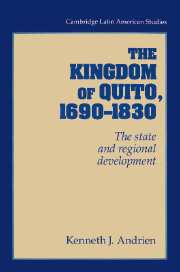Book contents
- Frontmatter
- Contents
- Acknowledgments
- Introduction
- PART I THE STATE AND SOCIOECONOMIC DEVELOPMENT
- PART II REFORM AND POLITICAL CONFLICT
- 7 Political turmoil and economic decline, 1690–1778
- 8 The price of reform, 1778–1830
- 9 Conclusion: the state and regional development
- Appendixes
- Glossary
- Bibliography
- Index
7 - Political turmoil and economic decline, 1690–1778
from PART II - REFORM AND POLITICAL CONFLICT
Published online by Cambridge University Press: 29 September 2009
- Frontmatter
- Contents
- Acknowledgments
- Introduction
- PART I THE STATE AND SOCIOECONOMIC DEVELOPMENT
- PART II REFORM AND POLITICAL CONFLICT
- 7 Political turmoil and economic decline, 1690–1778
- 8 The price of reform, 1778–1830
- 9 Conclusion: the state and regional development
- Appendixes
- Glossary
- Bibliography
- Index
Summary
By the late seventeenth century, the political regime in the Kingdom of Quito had become deeply divided by partisan conflicts. Like most important provinces, Quito was governed by an audiencia, but the justices were all venal officeholders with strong political, business, and social ties to regional elites. As a result of these relationships, the judges continually became enmeshed in local factional squabbles, making it impossible for them to dominate the political arena and respond consistently to metropolitan dictates. The same problems plagued the small coterie of fiscal officials and provincial magistrates, whose powers had been diminished over time by concessions to local magnates. The corregidores de indios in the region, for example, had lost their control over the collection of Amerindian tribute in 1734 to private tax farmers. For the most part, metropolitan governments in Madrid paid scant attention to strengthening the weak judicial state apparatus in Quito, unless local political conflicts in the kingdom became too disruptive. As a result, state policies most often evolved from the complex interplay of self-interested peninsular and creole elite factions, occasionally moderated by political pressures from local middle, laboring, or peasant classes. It was a time of endemic political conflict.
Persistent economic malaise in the Kingdom of Quito made matters of public policy particularly disruptive in this highly charged political environment. On three separate occasions – in 1711, 1738, and 1765 – crown policies and local socioeconomic problems intermingled to provoke bitter discord, which paralyzed the political process in the kingdom.
- Type
- Chapter
- Information
- The Kingdom of Quito, 1690–1830The State and Regional Development, pp. 165 - 189Publisher: Cambridge University PressPrint publication year: 1995



